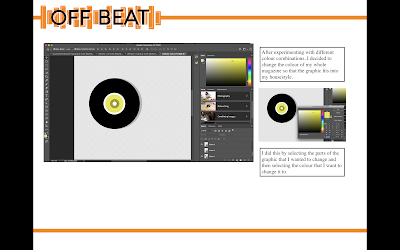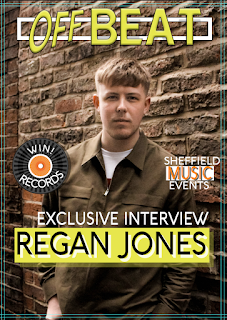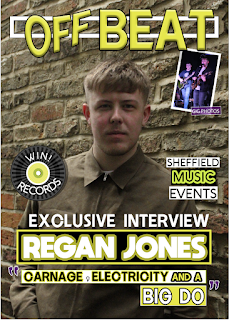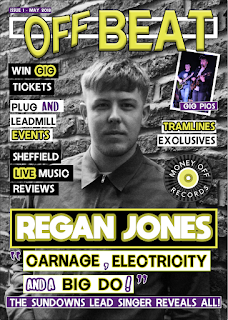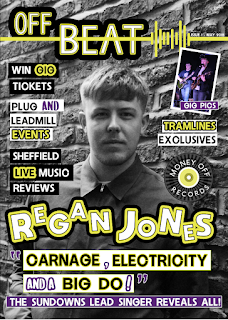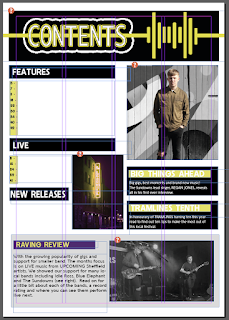EVALUATION
SPH Publishing is a brand new publishing house who are opening in Sheffield. They asked me to create a magazine which would cater for a Sheffield based audience. I decided that there wasn’t enough music magazine which were catered for a Sheffield audience, specifically indie music magazines. After the success of many Sheffield indie bands such as the Arctic Monkeys and the Sherlocks, I decided that this genre of magazine would be the best genre to make. This magazine is called “Off Beat” due to the connotations this name has with both the indie and music genres.
The magazine I created contains four pages, these are a front cover which is used to create a strong branding and entice people to want to read the magazine. The contents page which means that readers know what articles are in the magazine. It also has a double page spread which is about Regan Jones, the main feature in my magazine.
The front cover of my magazine contains many different conventions which are seen on most magazines, especially music magazines. I used multiple fonts on the cover of my magazine, this was to give it more depth as at first I just used the same font for all the text as that which I had used for my masthead. However I did not like the appearance of this because it made it look too neat and orderly. I decided to use different fonts in order to connote that more messy style which is frequently thought about through the indie/alternative style of music. In order for me to achieve this style, I used a range of different fonts which I found on the website DaFont. As the magazine I am creating has to be original, as said in the brief, this website was okay to use as all the fonts are copyright free. Examples of the fonts I used are “Ayuthaya”, “Embrionic55” and “MOON GET!”. All three of these fonts are san serif which means that it is easier for my audience to read what is on the front cover of my magazine, which is important as it needs to intrigue my target audience to pick up the magazine and read it. In order to create my masthead I used the font “Ayuthaya”, I decided to use this because not only did I like the shape of the letters for this font but when I was creating my masthead on Photoshop, it worked well with the graphic I was creating. I feel as though this font could look too too basic and simple however, if it was used in a big quality on my magazine. Embrionic5 was other font that I used, this is what most of the text that can be seen on the front of the magazine is written in. I especially like the way that this looks when it is just used as a coloured stroke where the text matches the background of the banner as it denoted neon lights which are something that can be seen in many different gig or music venues. I used this effect on words such as “gig” and “live” as I though that the idea of a neon light was most relevant with the connotations of these words. The font “MOON GET!” is the font that I used for purely for “Regan Jones” as this is the name of the person who the main article is about in the magazine. I wanted his name to stand out so I thought that it was best to do this by using a different font, but one that was still in keeping with the house style of the magazine. The fonts I have used on the front cover of the magazine are useful in starting to develop a house style for the magazine, another large contribution towards this is the house style colour scheme. In order to make sure that the text stood out to my audience as well as the whole appearance of my magazine as a whole needed to dit into a house style in order to create and develop a strong branding for “Off Beat”. This makes it easily recognisable. As “Off Beat” is an indie music magazine, it needs to appeal to both genders so I had to be careful with the colours that I was using. Originally the house style colours that I had decided on were orange and blue however when creating my magazine I discovered that these did not give me my desired look. The orange blended into the photographs too much and didn’t stand out as much as I wanted it to. I played around with a range of different colours and finally settled on using a bright green as I believed that this was a gender neutral colour but also connoted the music theme of my magazines as green is eccentric much like indie music. I decided that I needed another colour to compliment this and purple seemed to look really good with the green. This contrasted nicely as the green I had chosen was bright and the purple was dark but still stood out with the black and white. I believe that the bright eye-catching colours link nicely to the indie theme as they stand out like indie music. Along side the bright colours I also decided to use neutral colours like grey, black and white, this was just to balance out the vivid green that I used throughout the magazine. Throughout creating my magazine I knew that it was important to stick to the house style colours that I had chosen as I was creating the first issue of a brand new magazine so I creating a strong branding was important so that future issues would be recognisable for readers.
I decided to have Regan Jones as the main cover image on my front page. This is because he is not only the lead singer of the band, but the person that I interviewed. Originally I wanted this image to be an image of the band as a whole with the lead singer in the middle however other band member were extremely busy so I made the decision that it would be best to just shoot the lead singer. The image I used of Regan Jones has direct gaze so the reader not only sees the importance of this person but also makes them feel more of a personal connection with him as I believe that the use of eye contact within the image will entice my target audience to pick up my magazine. The way that I asked my model to dress was to fit into the house style of my magazine, I requested that Regan Jones wore something that fitted within to the indie genre, giving him guidance to wear something that was a neutral colour. The outfit that Jones wore was versatile as there was a lot of different ways in which it could be styled. Overall I believe that the cover image that I chose for the front cover was successful. I would have preferred to edit my image in a different way and not use a black and white image on my cover page but after lots of experimentation I decided that this was the best way for the photograph to be.
There are four cover lines on the cover of my magazine which are catchy and relate to the content which is inside. These make the reader intrigued to look at the article and want to read them. An example of this is with the cover line “tramlines exclusives” as the readers knows that the information inside cannot be found elsewhere so would therefore encourage my target audience to pick up my magazine. I as these could include things such as naming other local artists or bands that will feature inside the magazine. The main cover line or “sell line” is there to make the audience want to read the main feature, which is usually a double page spread, which is inside the magazines.























